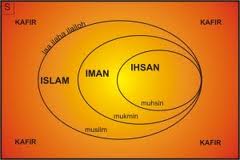
Vergeet het woord kafir dat erbuiten staat. Ik ben het met dat woord niet eens. Er zijn veel manieren om te geloven in één en edezelfde God/Allah
In het vorige artikel heb ik beschreven wat de islam is. De vijf zuilen, die ik omschreef vormen het fundament van de islam. Mensen die zichzelf moslim noemen weten vaak wel dat dit de belangrijke fundamenten zijn van hun geloof. Maar zoals ik ook al zei: deze verplichtingen kun je uitspreken en verrichten zonder dat je daar werkelijk met je hart bij bent betrokken en dan ben je uiterlijk alsnog een ‘goede moslim’. Niemand kan in je hart kijken behalve Allah de Alziende.
Naast islam heb je ook iman. Iman zou je kunnen omschrijven als geloof en geloven is iets wat je met je hart doet, want het betreft hier geloof in dingen die je niet kan aanraken of zien.
Iman is:
dat je gelooft in Allah,
de engelen en
de laatste dag ofwel de dag des oordeels.
Verder dat je gelooft in de profeten,
in de heilige boeken en
dat alles in het leven, goed of slecht afkomstig is van Allah.
Iman is dus eigenlijk de gemoedsgesteldheid die ligt achter de islam. Het geloof dat jou doet beseffen dat de vijf zuilen die een moslim zijn opgedragen goed zijn en dat je die met hart en ziel wilt uitvoeren, simpelweg omdat Allah dat heeft opgedragen in zijn Heilige boek, de Qur’an.
Het iman geeft je de kracht om door te zetten als het gaat om het uitvoeren van de vijf zuilen van het geloof, de islam (islam betekent onderwerping aan de Heilige Wil van Allah). Je iman steunt jou in de je onderwerping en geeft je de kracht om dat vol te houden, met de zegen van Allah, de Barmhartige en Genadevolle. Het besef dat je zonder zegen en steun van Allah niets bent.
Naast iman heb je ook ihsan. Ihsan (letterlijk vertaald als perfectie) Zou je kunnen omschrijven als een ‘zeker weten’.
Het komt neer op het aanbidden van Allah swta alsof je Hem ziet, want Hij ziet jou wel, ondanks dat jij Hem niet ziet. Het is dus nog sterker in het geloof staan dan het hebben van iman. Het is het wéten dat Allah je voortdurend gadeslaat en het je ook dienovereenkomstig gedragen.






